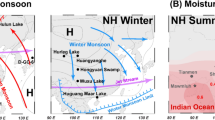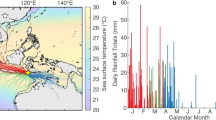Abstract
Arising from: G. Yancheva et al. Nature 445, 74–77 (2007)10.1038/nature05431; Yancheva et al. reply
On the basis of the anti-correlation of their palaeoclimatic proxy for the strength of the East Asian winter monsoon from Lake Huguang Maar, China, with stalagmite records of the strength of the summer monsoon, Yancheva et al.1 claim that the strengths of the summer and winter monsoons are anti-correlated on a decadal timescale. They argue that the summer rainfall deficit during ad 700–900 that they infer from their evidence of a stronger winter monsoon, in conjunction with a Tanros battle, led to the collapse of the Tang dynasty (ad 618–907). Using historical climate records, we show here that most cold winters during ad 700–900 were associated with relatively wet summers, indicating that the strengths of the winter and summer monsoons were not negatively correlated during this period.
This is a preview of subscription content, access via your institution
Access options
Subscribe to this journal
Receive 51 print issues and online access
$199.00 per year
only $3.90 per issue
Buy this article
- Purchase on Springer Link
- Instant access to full article PDF
Prices may be subject to local taxes which are calculated during checkout


Similar content being viewed by others
References
Yancheva, G. et al. Influence of the intertropical convergence zone on the East Asian monsoon. Nature 445, 74–77 (2007)
Zhang, D. E. A Compendium of Chinese Meteorological Records of the Past 3,000 Years [in Chinese with English summary] 327–371 (Jiangsu Education Press, Nanjing, 2004)
Zheng, S. Z., Zhang, F. C. & Gong, G. F. in Collection of Papers Regarding Climate Change and Extra Long-Term Prediction [in Chinese] 29–32 (compiled by China Meteorological Administration, Science Press, Beijing, 1977)
Man, Z. M. Climate in the Tang dynasty of China: Discussion of its evidence [in Chinese with English abstract]. Quat. Sci. 22, 20–30 (1998)
Zhang, D. E. Environmental change and agricultural development kept in historical documentary records for Northwest China. Adv. Clim. Change Res. 2 (suppl. 1). 28–34 (2006)
Fan, W. L. General History of China [in Chinese] Vol. III, 113–427; 376–377 (People’s Publishing House, Beijing, 1978)
Author information
Authors and Affiliations
Rights and permissions
About this article
Cite this article
Zhang, D., Lu, L. Anti-correlation of summer/winter monsoons?. Nature 450, E7–E8 (2007). https://doi.org/10.1038/nature06338
Received:
Accepted:
Published:
Issue Date:
DOI: https://doi.org/10.1038/nature06338
This article is cited by
-
Deciphering local and regional hydroclimate resolves contradicting evidence on the Asian monsoon evolution
Nature Communications (2023)
-
Deglacial variability of South China hydroclimate heavily contributed by autumn rainfall
Nature Communications (2021)
-
Anti-phase relationship between the East Asian winter monsoon and summer monsoon during the Holocene?
Journal of Ocean University of China (2017)
-
Correlation and anti-correlation of the East Asian summer and winter monsoons during the last 21,000 years
Nature Communications (2016)
-
A preliminary analysis of economic fluctuations and climate changes in China from BC 220 to AD 1910
Regional Environmental Change (2015)
Comments
By submitting a comment you agree to abide by our Terms and Community Guidelines. If you find something abusive or that does not comply with our terms or guidelines please flag it as inappropriate.



